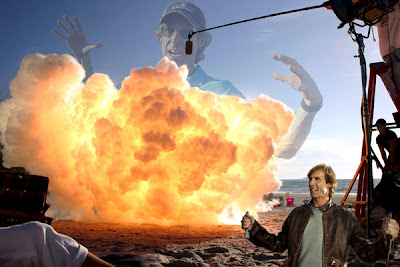 |
Just do what the sign says. Or more to the point, don't!
© 2005 The Estate of Douglas Adams/Touchstone Pictures |
In honor of the Tenth Annual
Towel Day and the work of Mr. Douglas Adams, we are proud to present a completely unlicensed setting of Douglas Adams' The Hitchhiker's Guide to the Galaxy as an opera in three acts.
Why not set
Hitchhiker's Guide as an opera? It's already been a videogame, a radio series, a BBC mini-series, a book, a movie, and a towel.
Dramatis personae:
Arthur Dent, an Englishman: Baritone
Ford Prefect, a writer, from Betelgeuse: Tenor
Zaphod Beeblebrox, the three-armed, two-headed President of the Galaxy: Mezzo-soprano (trouser part) and Counter-tenor.
Tricia "Trillian" McMillan, sexy space cadet: Coloratura soprano
Marvin, an android: Bass
Prostetnic Vogon Jeltz, a space captain and bureaucrat: Bass-baritone
Slartibartfast, Not important, but a tenor.
Mr. L. Prosser, construction worker: Character tenor
Babel Fish: Soprano
(This work is based on The Hitchhiker's Guide to the Galaxy by Douglas Adams. All characters © The Estate of Douglas Adams. Used affectionately, but (dirk) gently.)
Synopsis:
Act I: Mostly Harmless
Scene one:
A small, unremarkable house in the English countryside.
The action opens on a small, unremarkable house in the English countryside. We find Arthur Dent lying in the grass in front of his home, blocking the path of a bulldozer. (Duet: "Won't you please move, Mr. Dent?" with L. Prosser.)
 |
| Hoopy froods know where their towels are. Mine is in the bathroom. |
Dent's friend Ford Prefect enters, warning him that the world is about to end. (Aria: "I'm not from Guildford.") They go to a pub, and exit as the bulldozer begins to demolish the house as the workmen sing a chorus: ("Axes over the door.") Ford explains that he is from a small planet near Betelgeuse. He is a field researcher for that user-friendly galactic guidebook, the
Hitchhiker's Guide to the Galaxy. (Aria: "Always know where your towel is.")
Scene two: A local pub
Ford and Arthur enter the pub. A drinking chorus ("Six pints of bitter, the world's about to end") is sung, interrupted when everything goes bright white.
There is a horrible, ghastly silence. Curtain.
Act II: In Outer Space
Scene one: The dank hold of a Vogon ship
Arthur finds himself with Ford in the dank hold of a Vogon ship. (Duet: "Here's your towel/What can a Babel Fish do?") The Babel Fish has a wordless
arioso at this point, which is interrupted by a belligerent chorus of Vogons ("Resistance is Useless!") Ford and Arthur are marched in front of the Vogon captain Jeltz. He reads them a poem (Extended aria: "O freddled gruntbuggly.") They are sentenced to death, and expelled into space. (Duet: "So this is it, we're going to die.")
Scene two: Aboard the Heart of Gold
Arthur and Ford find themselves on another starship: the
Heart of Gold. (Duet: "It's improbably true.") They meet Ford's two-headed, three-armed cousin Zaphod Beeblebrox, the terminally depressed robot Marvin, and Zaphod's girlriend, Trillian. Sextet: ("Which way to Magrathea?")Arthur and Trillian sing a duet: ("It's not quite tea.")
Scene three: The Bridge of the Heart of Gold
Zaphod explains, in a patter duet featuring both of his heads, the answer to Life, the Universe and Everything. ("They say it starts with forty".) The
Heart of Gold flies to Magrathea, and is nearly destroyed by the planetary defense system, until the two missiles turn into a whale and a bowl of petunias. The chorus assembles across the front of the stage beneath a projection of the two falling objects, singing the choral fugue: ("Hey, what's this?/Oh no, not again.") The whale lands on the stage with a resounding
SPLAT!.
There is a horrible, ghastly silence.
 |
Diagram for the Babel Fish:
from The Hitchhiker's Guide to the Galaxy© BBC/Megadodo Publications
Act III: Magrathea |
Scene one: A gray, wind-swept place with two caves.
Zaphod serenades the twin suns of Magrathea: ("O Soulianis and Rahm!") and leads everyone (except Arthur and Marvin) into a cave. Arthur is freezing on the surface of Magrathea when he is confronted by Slartibartfast. (Aria: "My name isn't important.") They exit.
Marvin, left alone, has a long aria ("Oh I'm so very depressed.")
Scene two: The Factory Floor:
Slartibartfast brings Arthur to the factory floor of Magrathea, showing him how the Magratheans construct planets for the pleasure of the galaxy's idle rich. He explains the history of the construction of Deep Thought (with accompanying visual aids, a chorus, and a small ballet sequence.) The Ultimate Answer is given in another chorus ("O Day of Knowledge.")
Arthur finds his traveling companions, captured by Benji Mouse and Franki Mouse, the two programmers of Deep Thought. (Quintet: "How many roads must a man walk down?") as the characters grapple with the meaning of existence. The mice exit.
A squadron of Vogons, led by Jeltz march onstage and everyone flees. The Vogons sing a choral reprise of "O freddled gruntbuggly". At this point, the audience dies of shock and horror, and the opera ends as the performance venue is demolished by a fleet of yellow bulldozers.
There is a horrible, ghastly silence.






















